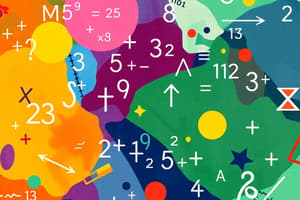Podcast
Questions and Answers
Which operation is NOT a fundamental arithmetic operation?
Which operation is NOT a fundamental arithmetic operation?
- Addition
- Subtraction
- Multiplication
- Exponentiation (correct)
Which of the following best describes algebra?
Which of the following best describes algebra?
- The analysis of motion and change.
- The study of shapes and their properties.
- The manipulation of variables and equations. (correct)
- The examination of statistical data.
Which geometric concept involves studying the properties of shapes without reference to their specific size?
Which geometric concept involves studying the properties of shapes without reference to their specific size?
- Transformation
- Congruence
- Symmetry
- Similarity (correct)
What is the primary focus of differential calculus?
What is the primary focus of differential calculus?
Which of the following is a characteristic of discrete mathematics?
Which of the following is a characteristic of discrete mathematics?
In geometry, which of the following shapes is NOT considered a basic shape?
In geometry, which of the following shapes is NOT considered a basic shape?
The process of finding the roots of a polynomial equation is primarily associated with which mathematical branch?
The process of finding the roots of a polynomial equation is primarily associated with which mathematical branch?
Which of the following statements about calculus is incorrect?
Which of the following statements about calculus is incorrect?
Flashcards
Arithmetic
Arithmetic
Basic math operations: addition, subtraction, multiplication, and division.
Algebra
Algebra
Extends arithmetic using variables and equations to represent unknowns.
Geometry
Geometry
Study of shapes, sizes, and properties of space.
Calculus
Calculus
Signup and view all the flashcards
Discrete Math
Discrete Math
Signup and view all the flashcards
Euclidean Geometry
Euclidean Geometry
Signup and view all the flashcards
Differential Calculus
Differential Calculus
Signup and view all the flashcards
Integral Calculus
Integral Calculus
Signup and view all the flashcards
Study Notes
Fundamental Concepts
- Mathematics is a formal system of logic and reasoning used to quantify and understand patterns, relationships, and structures in the world.
- It encompasses various branches, each dealing with different aspects of numbers, shapes, and other abstract concepts.
- Key foundational concepts include arithmetic, algebra, geometry, and calculus.
Arithmetic
- Arithmetic deals with the basic operations of numbers: addition, subtraction, multiplication, and division.
- It forms the basis for more complex mathematical operations.
- Properties of numbers, like commutativity, associativity, and distributivity, are fundamental in arithmetic.
- Different number systems (natural numbers, integers, rational numbers, real numbers, complex numbers) each have distinct properties and uses.
Algebra
- Algebra extends arithmetic by introducing variables and equations.
- It allows for the representation of unknown quantities and relationships in symbolic form.
- Solving equations and inequalities is a cornerstone of algebraic methods.
- Concepts like polynomials, functions, and graphs are vital for understanding algebraic relationships and their visualizations.
- Factoring, expanding, and simplifying expressions are crucial techniques.
- Linear and non-linear equations, systems of equations, are widely used.
Geometry
- Geometry studies shapes, sizes, positions, and properties of space.
- Basic shapes include points, lines, angles, triangles, quadrilaterals, and circles.
- Euclidean geometry focuses on flat surfaces, while non-Euclidean geometry deals with curved spaces.
- Concepts like congruence, similarity, and transformations are important geometric tools.
- 3-dimensional geometry extends 2-dimensional concepts to volume and other three-dimensional measures.
- Coordinate geometry uses coordinates to define locations and relationships and create graphs.
Calculus
- Calculus encompasses differential and integral calculus.
- Differential calculus studies rates of change, such as velocities and slopes.
- Integral calculus calculates accumulated quantities, such as areas and volumes.
- Derivatives and integrals are fundamental tools in calculus.
- Applications of calculus are vast, including in physics, engineering, economics, and computer science.
Discrete Mathematics
- Discrete mathematics deals with objects that can be counted, as opposed to continuous quantities.
- Topics include sets, logic, relations, graphs, sequences, and counting principles.
- Crucial for computer science, cryptography, and algorithms.
Other Branches
- Number theory focuses on the properties of integers.
- Probability and statistics deal with uncertainty and data analysis.
- Linear algebra examines vector spaces and linear transformations, important in many fields.
- Topology studies the properties of shapes that are preserved under continuous deformations.
Studying That Suits You
Use AI to generate personalized quizzes and flashcards to suit your learning preferences.




